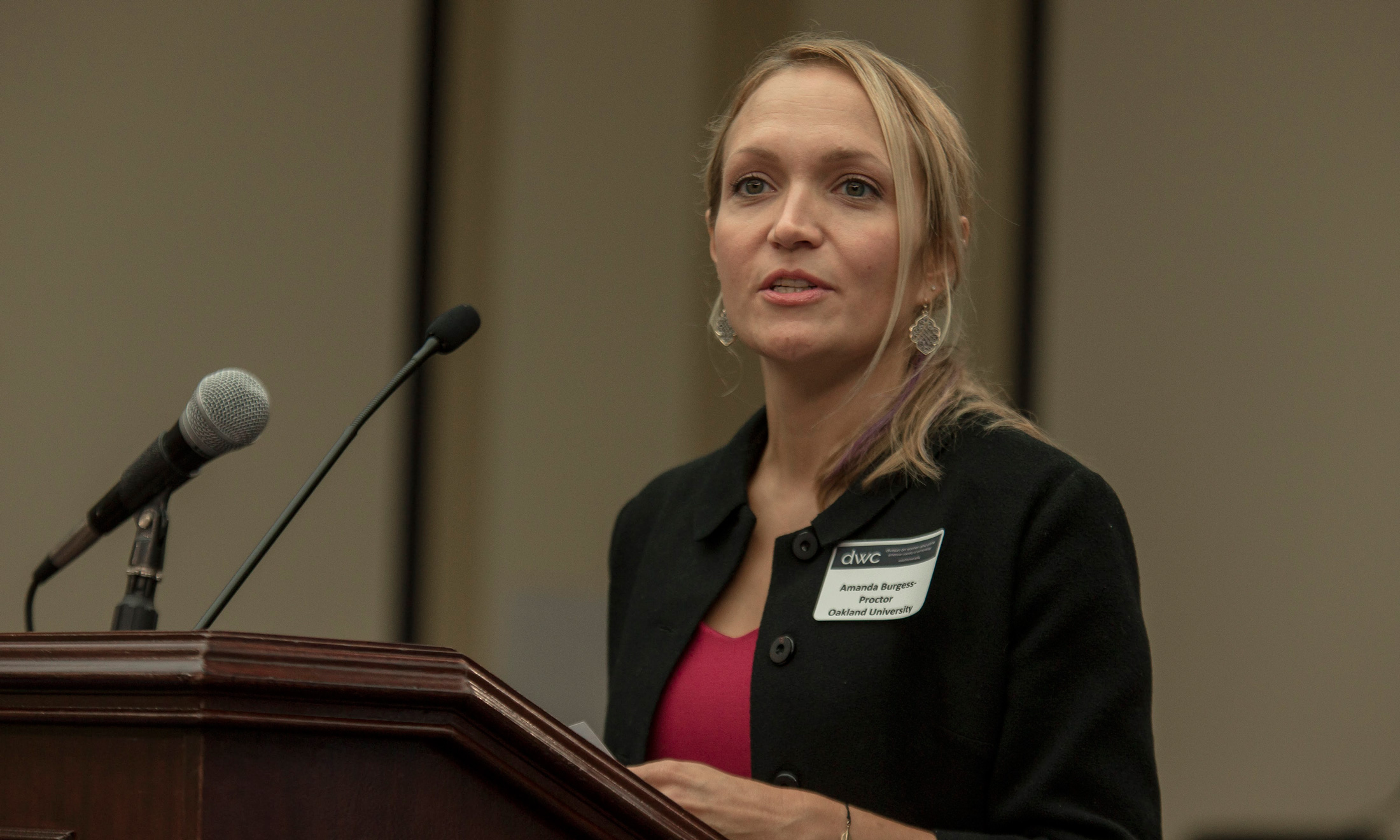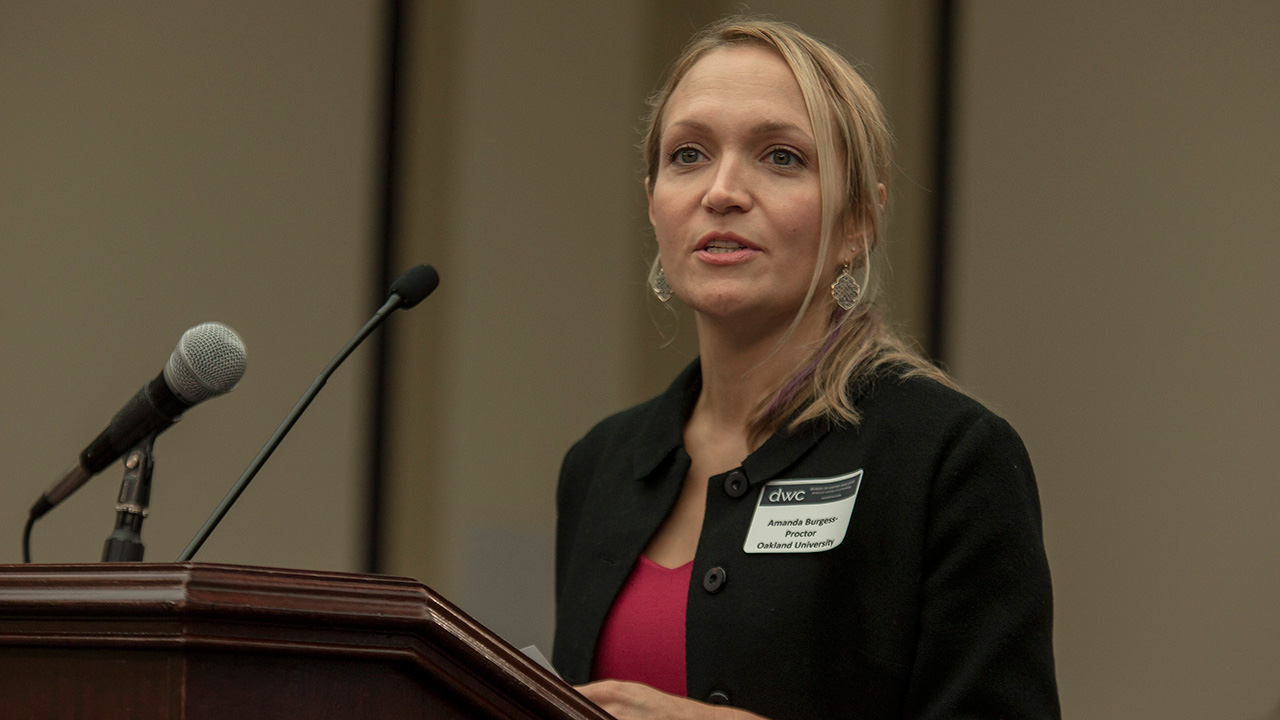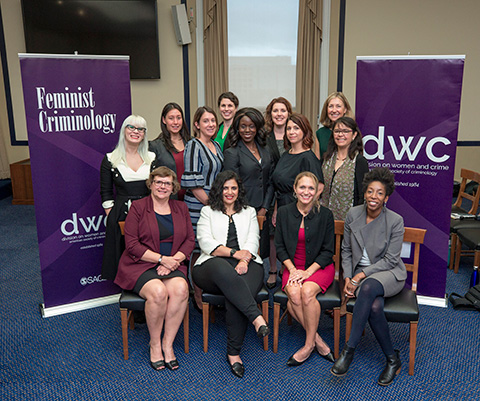- YouTube
- TikTok
Professor takes part in Congressional Briefing on ‘Improving Justice for Women and Girls’
OU's Amanda Burgess-Proctor moderated question-and-answer sessions at the briefing, which was hosted by the American Society of Criminology Division on Women and Crime.

Dr. Burgess-Proctor pictured at the Congressional Briefing, which took place in the Rayburn House Office Building, in Washington D.C.

Criminal Justice Professor Amanda Burgess-Proctor was among a distinguished group of experts that took part in a Congressional Briefing in Washington D.C. The October 11 event was hosted by the American Society of Criminology (ASC) Division on Women and Crime (DWC), and spotlighted the topic of “Translating Research to Policy: Improving Justice for Women and Girls.”
“This is the first time in the DWC's 34-year history that anything like this has happened, and we are the first ASC Division to ever host our own briefing,” Burgess-Proctor said.
Attendees included legislative staffers from the U.S. House of Representatives, representatives from a variety of federal offices and agencies (e.g. U.S. Sentencing Commission, Department of Justice, Health and Human Services Office on Women's Health), area criminal justice agencies (e.g. Metropolitan Police Department, D.C. Superior Court), and faculty and staff from nearby universities.
Front Row from left: Dr. Rosemary Barberet (John Jay College of Criminal Justice); Dr. Sheetal Ranjan (William Paterson University); Dr. Amanda Burgess-Proctor (Oakland University); Dr. Jocelyn Fontaine (Justice Policy Center, Urban Institute); Middle Row, from left Dr. Shelly Clevenger (Illinois State University); Dr. Jordana Navarro, The Citadel; Dr. Jennifer Cobbina (Michigan State University); Dr. Rachel Lovell (Begun Center, Case Western Reserve University); Cecilia Menjívar (UCLA); Back Row, from left: Dr. Anne Kringen (University of New Haven); Dr. Tara Richards (University of Nebraska - Omaha); Dr. Cara Rabe-Hemp (Illinois State University) Dr. Lynn Addington (American University) |
Panelists came from institutions around the country and were all members of the DWC, whose mission is to facilitate and promote research and theory development, pedagogical strategies, and curricular enhancement that strengthen the links between gender, crime and justice.
The panelists summarized “the state of the science” in their areas of expertise and offered evidence-based policy recommendations on a variety of issues related to improving justice for women and girls.
These included data-driven responses to campus gender-based violence; asylum protections for immigrant women fleeing violence; recruitment and retention of women in law enforcement; reducing the backlog of untested sexual assault kits; reducing and preventing the cyber-abuse of women and girls; and supporting formerly incarcerated women returning to the community.
Each panelist presented their research and participated in a question-and-answer session moderated by Burgess-Proctor.
Much of the groundwork for the event was laid the previous year, when Burgess-Proctor chaired the Division. The current chair, Sheetal Ranjan, helped bring the event to fruition by working with U.S. Representative Josh Gottheimer, from Ranjan’s home state of New Jersey.
“It was exciting to be able to do a panel focused specifically on women and girls, especially at a time when issues like campus sexual assault and women's correctional needs are so much at the forefront of public discussion,” Burgess-Proctor said. “We hope to have laid the foundation for this event to be replicated in the future and to have inspired others to organize similar events.”
Policy essays from the briefing will be published in a special issue of Translational Criminology, the magazine of the Center for Evidence-Based Crime Policy at George Mason University.


 October 17, 2018
October 17, 2018